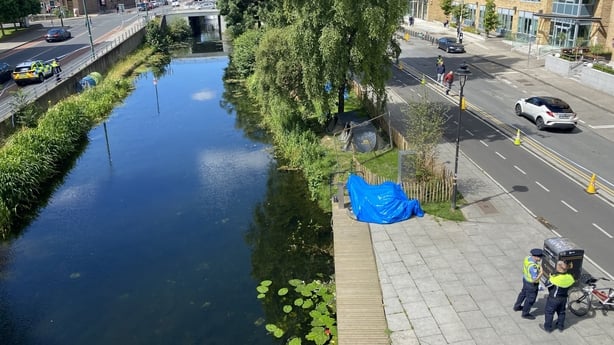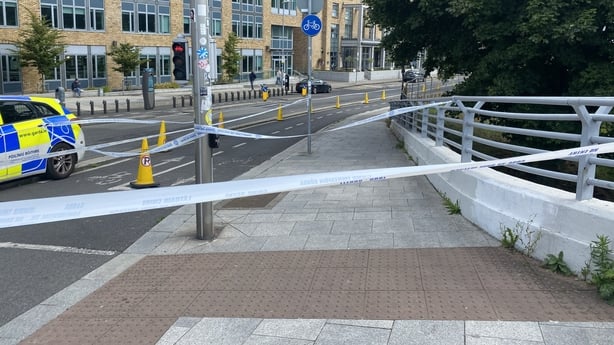An investigation is under way following the discovery of two bodies in the Grand Canal in Dublin.
Gardaí say that the bodies of the two men, who were aged in their 40s, were recovered from the canal this morning. Both men were pronounced dead at the scene.
It is understood that the two men were Irish nationals.
A forensic examination is being carried out inside two tents, a green tent and a navy tent, pitched close to the banks of the Grand Canal.
A number of items have been removed from the tents inside evidence bags as part of the investigation.
The bodies were found close to the Ranelagh Road bridge.
A cordon was put in place on both sides of the canal whilst a forensic examination and search by garda divers was conducted.
The alarm was first raised by a passer-by early this morning, when they saw what looked like two bodies in the water.
Gardaí arrived at the scene close to the Grand Parade and Charlemont Luas stop shortly after 8am.
Both men have been identified although the formal identification process is still ongoing.

It is understood that the two people were homeless and the results of post-mortem examinations will determine the course of the investigation.
A large number of people have been sleeping in tents close to the scene where the bodies were found this morning.

Some said they were first alerted to what happened when they saw emergency services at the scene this morning.
Volunteers working with others who were camped nearby, including international protection applicants, have described the tents being so close to the water as a "dangerous situation", but they say that there is very little available space with barriers close to the Grand Canal.
The post-mortem examinations on the two men are expected to take some time.
'Horrendous' to lose lives in 'such tragic circumstances' - Tiglin
Chairperson of the homeless charity Tiglin, Aubrey McCarthy, was in Dublin today for a free event for homeless people in the city and said news of the two deaths was terrible.
"It's so disheartening," he said. "I am hearing that they are two Irish individuals. We have been doing this for 20 years, helping Irish people and we always try to get them into hostels, get them into housing but some people live on the streets and we provide the basic necessities such as tents and a sleeping bag."
He said his organisation did not direct people where to go or say where was safe.
He said many people slept in discrete locations such as under railway bridges or in disused housing but that others gathered in areas like the Grand Canal where there can sometimes be protection in numbers.
He said something needed to be done to increase the focus on helping homeless people.
"To have lost their lives in such tragic circumstances is horrendous and so upsetting for all of the team at Tiglin," he added.
Local Fianna Fáil TD Jim O'Callaghan has expressed his condolences to the family and friends of the two men.
Speaking to RTÉ News, he said: "I'm extremely sorry to hear about the fact that two men have died. We don't know yet their identity but it's a tragic development in the area. The gardaí are investigating the matter."
Mr O'Callaghan said that what happens next will depend on the outcome of the garda investigation.
"But if it is the case that the men were staying in tents or they were homeless, I suppose it does underline the dangerousness of being living in a tent and being homeless," he said.
"Obviously there's an obligation to say, to ensure that we provide accommodation for people who find themselves in that desperate situation."
The Dublin Region Homeless Executive (DRHE) offered its sympathies to the families and friends of the two men.
The DHRE said it was in contact with gardaí and is awaiting confirmation of the men's identities to establish if they were known to homeless services.
It said there "is sufficient emergency accommodation in Dublin", adding that it encourages "anyone seeking accommodation to contact their local authority".
The DHRE also urged members of the public to download the Rough Sleeper Alert app "to assist teams in supporting people most at risk".







